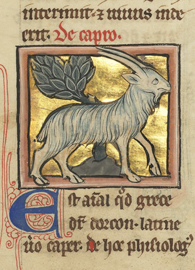Selections From Israel's Story Week 7
The Day of Atonement: Leviticus 16
By Sara Koenig
Seattle Pacific University Associate Professor of Biblical Studies
Read this week’s Scripture: Leviticus 16
09:16

 Enlarge
Enlarge
As we continue in the book of Leviticus, we encounter another text that takes some work to understand. At first read, this is a strange text, filled with details about animal sacrifices, burning incense, and sprinkling blood. There is almost stereotypically religious and even judgmental language of being clean and unclean. The seriousness of it all is underscored by the repeated references to Aaron’s death, if he does not follow the letter of these laws (16:2, 13).
Atonement
At second read, though, the reasons for doing this become more apparent and profound. This chapter explains that the people of Israel are unclean “because of their transgressions, all their sins” (16:16), and that through the priest’s actions “atonement shall be made for you, to cleanse you; from all your sins you shall be clean before the LORD” (16:30).
Again, the overarching message of the book of Leviticus is that God is holy and humans are not, but the content tells about how to overcome the gap. This chapter speaks about the day when all of Israel’s sins are atoned for, when their uncleanness will be changed to cleanness in the presence of the LORD.
The word “atonement” is one of those religious words often used without being defined. Breaking it down into its component parts in English, we see that it means at-one-ment, which was how it was used in the 16th century to indicate harmony and unity. It is, literally, ‘being at one with another.” It also means satisfaction or reparation for a wrong or injury, which is how it was used in Ian McEwan’s 2001 novel and the 2007 movie Atonement.
The Hebrew is kaphar, which means “to cover over, pacify, or make propitiation” [Author’s Note 1]. Indeed, this single word — atonement — is a rich one, referring at the same time to the sacrifice that covers over sins and purifies the people so that they can be reconciled and united with God.
Connections are made with the previous Lectio at the very start of this chapter, which says, “after the death of the two sons of Aaron, when they drew near before the LORD and died …” (Leviticus 16:1). The way this is worded does not quite capture what happened to Nadab and Abihu: it was not simply that they drew near before the LORD and died, but that they were killed because they brought strange fire before the LORD (Leviticus 10:1-2) [Author’s Note 2]. Still, we notice that the text itself does not want us to forget or gloss over these hard stories, but reminds us of them.
Instructions to Aaron
After reminding us of the seriousness of what happened to Nadab and Abihu, the chapter continues by emphasizing the careful preparation required for Aaron before he enters into the presence of the LORD in the inner sanctuary. He must offer a bull as a sin offering for himself (16:11), for any unintentional sins he had committed (compare Leviticus 4:1–12), and a ram for a burnt offering (compare Leviticus 1). He must bathe with water, and put on holy, linen clothing (Leviticus 16:4).
It may be that the reason why the priest must dress in that specific material is that entering into the inner sanctuary is equivalent to entering into the heavenly council, whose members, the angels, also wear linen (compare Ezekiel 9:2–3 and Daniel 10:5). He must also burn incense such that it creates a cloud in the inner sanctuary (Leviticus 16:12–13).
Two Goats
Of course, this Day of Atonement is also for the priest to offer sacrifices on behalf of the people, and we read that Aaron takes two goats for this purpose (16:5, 7-22). He is commanded to “cast lots” on the two goats, to see which goat will be killed, and which one will be sent into the wilderness. Two things stand out in verses 7–10:
- The practice of casting lots. Casting lots may seem to be an overly random or arbitrary practice, similar to drawing straws or flipping a coin. However, it happens in a number of places in the Old Testament as people make decisions (Joshua 18:6-10; 1 Samuel 14:42; 1 Chronicles 26:13–14; Nehemiah 10:34; Jonah 1:7; etc.). Proverbs 16:33 also expresses the understanding that God is in control of the act: “The lot is cast into the lap, but the decision is the LORD’s alone.”
- “Azazel.” Azazel is first mentioned in 16:8. What is it? Some believe that Azazel is a name for the scapegoat, as the Jewish Publication Society translation of 16:26 suggests in its reference to “the Azazel-goat.” Others say it is not a what, but a where, referring to a geographical location in the wilderness (compare 16:10, 22). In later Jewish literature — specifically the Book of Enoch — Azazel is the name given to one of the angels who rebels against God in the days before Noah’s flood [Author’s Note 3]. This chapter is the only place in the entire Old Testament where the word appears, and within the chapter it is clear that it is — somehow — connected with Israel’s atonement. The word itself seems to be an intensification of the Hebrew word “to remove,” so it would be translated as “entire removal, i.e., of sin and guilt.”
And that is precisely what happens with the second goat. After Aaron sacrifices the bull for himself and his house (16:11–14), and sacrifices the first goat for all of Israel (16:15–19), he is commanded to lay his hand on the head of the living goat and “confess over it all the iniquities of the people of Israel, and all their transgressions, all their sins, putting them on the head of the goat” (16:21).
It would seem that it might take a long time to do that! But this act, we are told, transfers the sins of the people onto the goat, who is then sent out into the wilderness, “to a barren region” (Verse 22). If you put a saddle or a sack of supplies onto an animal, and it carries it away, that object is gone [Author’s Note 4]. So, too with this second goat: it carries all the iniquities, transgressions and sins of the people of Israel away until they are gone.
After contact with the goat, Aaron must further purify himself (16:23–25), as must the one who set the goat free and the one who gets rid of the remains of the sacrificed bull and goat (16:26–28). The chapter ends with the commandment that this day of atonement is to be practiced yearly, forever (16:29, 31). Within Judaism today, this is Yom Kippur, one of the high holy days still set aside for fasting, prayer, and repentance.
In the New Testament book of Hebrews, Jesus is identified as the greatest high priest. According to Hebrews 7–8, this is because he is the priest forever, and because he does not have to routinely offer sacrifices on behalf of the people — he did it once for all. But in Hebrews 9–10, Jesus is not only the high priest; he is also the scapegoat: all the sins of the people were put on him. Jesus is also the sacrifice: it was his blood that purified and made clean by covering over human sinfulness. Jesus is the way of atonement: through him, all humans may be at one with God.
Questions for Further Reflection:
- This chapter is filled with complex religious practices that Israel is commanded to participate in. What does the Lectio writer say about how this chapter fits in to the overall purpose of Leviticus?
- Which of the definitions of atonement (being at one with another; satisfaction or reparation for a wrong or injury; to cover over, pacify, or make propitiation) best gets at your understanding of atonement? Which one makes the least sense to you? Why?
- The Lectio writer draws our attention to Hebrews 7-8 and Hebrews 9-10 at the end of this week’s reading. If you haven’t already done so, take a few minutes to read those chapters. In what ways does Jesus fulfill the Levitical role of the high priest? Of the scapegoat?

This work is licensed under a Creative Commons License.




